| Srl | Item |
| 1 |
ID:
089355
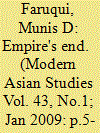

|
|
|
|
|
| Publication |
2009.
|
| Summary/Abstract |
Nizam-ul-Mulk (d. 1748) was a Mughal nobleman who founded the post-Mughal successor state of Hyderabad. Engaging the Nizam's long and varied career, this essay re-evaluates the Nizam's decision to abandon the Mughal imperial system. In so doing, it highlights the ways in which the Nizam's story contrasts with that of founders of other post-Mughal successor states. This essay also seeks to explore Hyderabad's early history, the unique challenges faced by the new state, and the inventive ways in which it sought to overcome them. Ultimately, this essay aims to broaden and complicate our understanding of India's political history in the late-seventeenth and early-eighteenth century.
|
|
|
|
|
|
|
|
|
|
|
|
|
|
|
|
| 2 |
ID:
001560
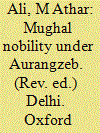

|
|
|
|
|
| Edition |
Rev. ed.
|
| Publication |
DelhI, Oxford University Press, 1997.
|
| Description |
xxv, 294p.hbk
|
| Standard Number |
0195639766
|
|
|
|
|
|
|
|
|
|
|
|
Copies: C:1/I:0,R:0,Q:0
Circulation
| Accession# | Call# | Current Location | Status | Policy | Location |
| 041093 | 954.025/ALI 041093 | Main | On Shelf | General | |
|
|
|
|
| 3 |
ID:
040281
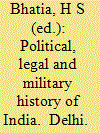

|
|
|
|
|
| Publication |
DelhI, Deep & Deep Publications, 1984.
|
| Description |
384p.hbk
|
| Contents |
Vol. V
|
|
|
|
|
|
|
|
|
|
|
|
Copies: C:1/I:0,R:0,Q:0
Circulation
| Accession# | Call# | Current Location | Status | Policy | Location |
| 023121 | 954.02/BHA 023121 | Main | On Shelf | General | |
|
|
|
|
| 4 |
ID:
098098
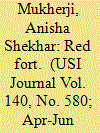

|
|
|
| 5 |
ID:
172356
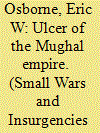

|
|
|
|
|
| Summary/Abstract |
The Muslim Mughal Empire of India found itself at the height of its power under the reign of Emperor Aurangzeb (r. 1658–1707), yet the foundations of that power were unstable at the death of the emperor. While Aurangzeb was able to extend his dominion over the majority of the Indian sub-continent the cost of doing so greatly weakened Mughal fortunes in the years following his reign. This situation resulted from a shift in his religious policies towards non-Muslims that alienated groups in the empire that had once been part of a syncretic ruling relationship. The main problem group was the Marathas, whose insurgency Aurangzeb never fully defeated over the course of a twenty-seven-year war. The Marathas used the harsh religious stance of the emperor to mount a campaign for the creation of a Hindu kingdom in the area south of the Deccan Plateau. The failure to completely quell this revolt led to Maratha domination of large swaths of the northern Mughal Empire following the death of Aurangzeb. This heralded a decline in Mughal fortunes that were ultimately exploited by foreign powers, chief among them Great Britain.
|
|
|
|
|
|
|
|
|
|
|
|
|
|
|
|